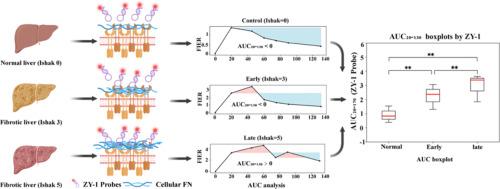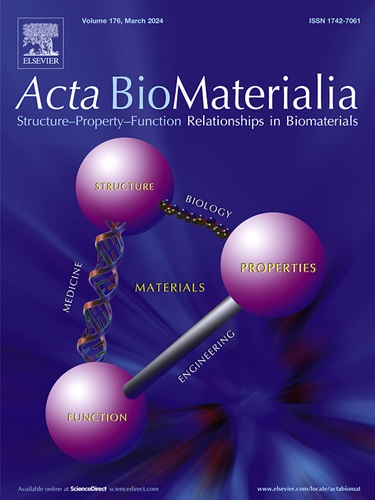Cellular fibronectin-targeted fluorescent aptamer probes for early detection and staging of liver fibrosis
IF 9.4
1区 医学
Q1 ENGINEERING, BIOMEDICAL
引用次数: 0
Abstract
Liver fibrosis is a key process in the progression of chronic liver disease to cirrhosis. Currently, early diagnosis and precise staging of liver fibrosis remain great challenges. Extracellular matrix (ECM) molecules expressed specifically during liver fibrosis are ideal targets for bioimaging and detection of liver fibrosis. Here, we report that fluorescent probes based on a nucleic acid aptamer (ZY-1) targeting cellular fibronectin (cFN), a critical ECM molecule significantly accumulating during liver fibrosis, are promising bioimaging agents for the staging of liver fibrosis. In the work, the outstanding binding affinity of ZY-1 to cFN was validated through an in vitro model of human-derived hepatic stellate cells (HSCs). Subsequently, we constructed different ZY-1-based fluorescent probes and explored the real-time imaging performance of these fluorescent probes in CCl4-induced mouse models of different liver fibrosis stages. The ZY-1-based fluorescent probes, for the first time, effectively identified and distinguished early-stage liver fibrosis (stage 3 of Ishak 6) from advanced liver fibrosis (stage 5 of Ishak 6). The proof-of-concept study provides compelling evidences that ZY-1-based probes are a promising tool for the early diagnosis and staging of liver fibrosis and paves the way for further development of clinical-related diagnosis strategies for fibrotic diseases of the liver and other organs.
Statement of significance
Currently, early diagnosis and accurate staging of liver fibrosis continue to present significant challenges. This study demonstrates that fluorescent probes based on the nucleic acid aptamer ZY-1, which targets cellular fibronectin (cFN)—a crucial extracellular matrix (ECM) molecule that significantly accumulates during liver fibrosis—are promising bioimaging agents for staging liver fibrosis. The ZY-1-based fluorescent probes effectively identified and differentiated early-stage liver fibrosis from advanced liver fibrosis. This proof-of-concept study not only provides compelling evidence that ZY-1-based probes show promise for the early diagnosis and staging of liver fibrosis but also paves the way for further investigations into the use of ZY-1 in detecting other diseases associated with cFN.

用于肝纤维化早期检测和分期的细胞纤连蛋白靶向荧光适配体探针。
肝纤维化是慢性肝病发展为肝硬化的关键过程。目前,肝纤维化的早期诊断和精确分期仍面临巨大挑战。肝纤维化过程中特异表达的细胞外基质(ECM)分子是生物成像和肝纤维化检测的理想靶标。细胞纤连蛋白(cFN)是一种在肝纤维化过程中显著积累的关键 ECM 分子,我们在此报告说,基于针对细胞纤连蛋白的核酸适配体(ZY-1)的荧光探针是用于肝纤维化分期的前景广阔的生物成像剂。在这项工作中,我们通过人源肝星状细胞(HSCs)体外模型验证了 ZY-1 与 cFN 的出色结合亲和力。随后,我们构建了不同的基于 ZY-1 的荧光探针,并探索了这些荧光探针在 CCl4 诱导的不同肝纤维化阶段小鼠模型中的实时成像性能。基于ZY-1的荧光探针首次有效地识别并区分了早期肝纤维化(伊萨克6期的第3阶段)和晚期肝纤维化(伊萨克6期的第5阶段)。这项概念验证研究提供了令人信服的证据,证明基于 ZY-1 的探针是一种很有前途的肝纤维化早期诊断和分期工具,并为进一步开发肝脏和其他器官纤维化疾病的临床相关诊断策略铺平了道路。意义说明:目前,肝纤维化的早期诊断和准确分期仍面临重大挑战。细胞纤连蛋白(cFN)是一种关键的细胞外基质(ECM)分子,在肝纤维化过程中会大量积聚。本研究证明,基于核酸适配体 ZY-1 的荧光探针是一种很有前景的生物成像剂,可用于肝纤维化的分期。基于 ZY-1 的荧光探针能有效识别和区分早期肝纤维化和晚期肝纤维化。这项概念验证研究不仅提供了令人信服的证据,证明基于ZY-1的探针有望用于肝纤维化的早期诊断和分期,还为进一步研究ZY-1在检测与cFN相关的其他疾病方面的应用铺平了道路。
本文章由计算机程序翻译,如有差异,请以英文原文为准。
求助全文
约1分钟内获得全文
求助全文
来源期刊

Acta Biomaterialia
工程技术-材料科学:生物材料
CiteScore
16.80
自引率
3.10%
发文量
776
审稿时长
30 days
期刊介绍:
Acta Biomaterialia is a monthly peer-reviewed scientific journal published by Elsevier. The journal was established in January 2005. The editor-in-chief is W.R. Wagner (University of Pittsburgh). The journal covers research in biomaterials science, including the interrelationship of biomaterial structure and function from macroscale to nanoscale. Topical coverage includes biomedical and biocompatible materials.
 求助内容:
求助内容: 应助结果提醒方式:
应助结果提醒方式:


